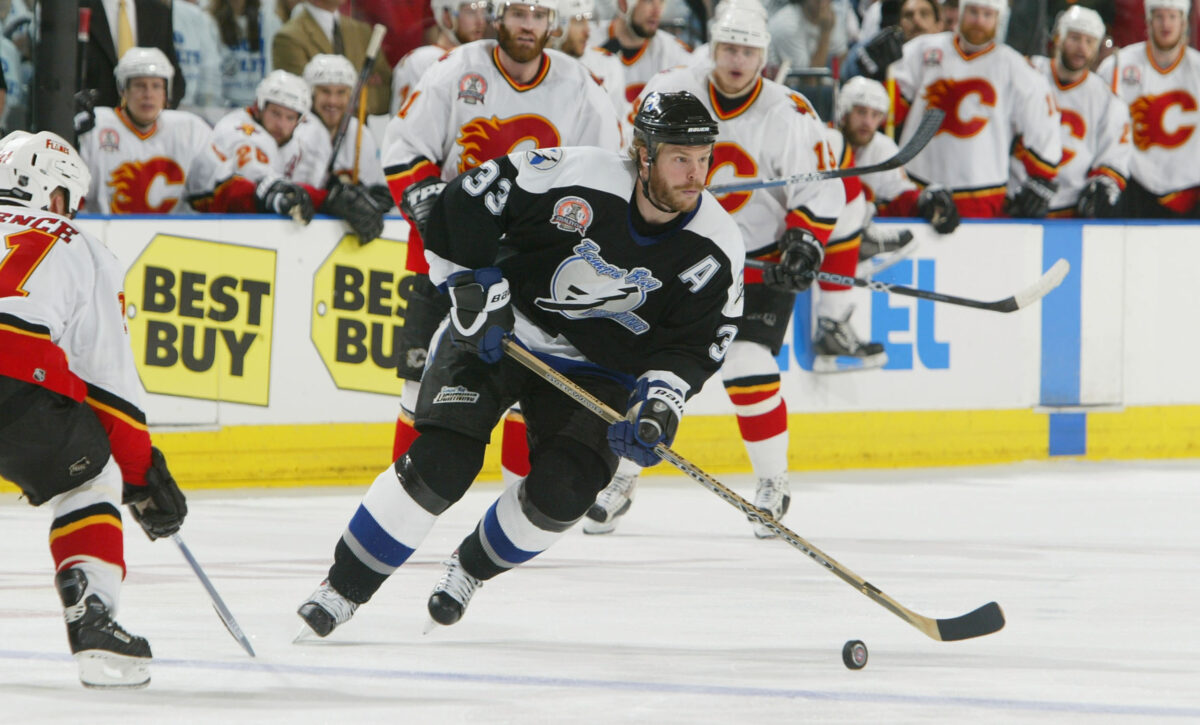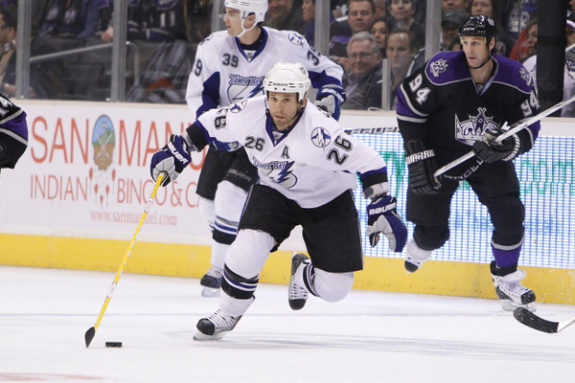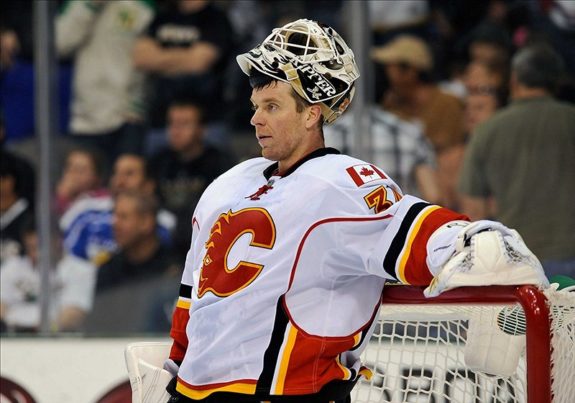The 2003-04 Tampa Bay Lightning had a stacked roster. The amount of talent, especially at forward, was impressive. Some of the names many hockey fans think of immediately are Martin St. Louis, Vincent Lecavalier, Brad Richards, then-captain Dave Andreychuk, and Ruslan Fedotenko, among others. There were contributors all throughout that lineup that helped them clinch the club’s first-ever Stanley Cup.

Another stellar weapon for the Lightning offense came from winger Fredrik (or Freddy) Modin. He was a big skilled player at 6-foot-4, and he backed up his time on the ice with his fair amount of production. His name may not come up as immediately as St. Louis or Richards, but Modin proved to be a valuable asset.
Arrival and Initial Seasons in the Bay Area
Modin originally debuted in the NHL for the Toronto Maple Leafs. The Swedish talent was selected as a third-round pick in the 1994 Draft (64th overall), and made his league debut during the 1996-97 season, where he suited up in 76 games and produced six goals and seven assists. He had a strong support system when he was younger as a from players like Mats Sundin, Doug Gilmour, and Wendel Clark. Modin improved his numbers the following two campaigns with 32 and 31 points, respectively. Specifically, he posted the following in the regular season for Toronto during his time there:
- 1996-97: 6 goals and 7 assists for 13 points in 76 games
- 1997-98: 16 goals and 16 assists for 32 points in 74 games
- 1998-99: 16 goals and 15 assists for 31 points in 67 games
Out of the three seasons he was a Leaf, the team made the playoffs once (1998-99). Toronto made it all the way to the Eastern Conference Final, where they took on the Buffalo Sabres. They would not get past Hockey Hall of Fame goalie Dominik Hasek and the rest of that team though, and the Leafs were eliminated in five games. Modin played in eight contests for that run and he went pointless.
Prior to the 1999-00 season, Modin was traded to Tampa in exchange for defenseman Cory Cross and a seventh-round draft pick in 2001. It took him no time to become a solid scorer and help out a young former first overall pick in Lecavalier. Modin was second in points on the roster in 1999-00, behind Lecavalier with 48 (22 goals and 26 assists). The Bolts were not yet molded into the dynamic powerhouse they would become only a few campaigns later. Most of that 2004 team was not there yet. Even St. Louis was still with the Calgary Flames during that time, and wouldn’t join the Lightning until 2000-01.

Modin over the course of the next few seasons continually boosted his point production as the team as a whole gained more complementary assets into the lineup. His second campaign in Tampa saw him achieve his career high in goals at 32. Later on in 2003-04, he chalked up his best regular-season stats in both assists (28) and points (57). The Lightning as an organization meanwhile brought in players like St. Louis from Calgary, goalie Nikolai Khabibulin from the Phoenix Coyotes, talents like Richards working his way to the NHL, and one of the final touches being the addition of forward Cory Stillman from the St. Louis Blues prior to the 2003-04 campaign.
Related: Jon Cooper Deserves to Lead the 2021 Jack Adams Conversation
The Bolts broke out with Modin on the team during 2002-03. The team finished in third place in the Eastern Conference for the regular season at 36-25-16-5, (the last two are ties and overtime losses, respectively) for a total of 93 points. Only the Presidents’ Trophy-winning Ottawa Senators (113 points) and New Jersey Devils (108) had more in the East. The Lightning followed that up with a postseason run to the semifinals where they were defeated by the Devils in five games. Despite the disappointment, there was reason to be excited. Most of the pieces seemed to be in place. Now was just a matter of the perfect execution. Fortunately enough, Modin and the rest of Tampa did not have to wait too long.
Becoming a Stanley Cup Champion
2003-04 had the Lightning produce the best regular season record in the East, and the second-best in the league to the Western Conference’s Detroit Red Wings. Tampa posted a record of 46-22-8-6. In the playoffs; they surpassed the New York Islanders in five games, swept the Montreal Canadiens in four, and fought tooth-and-nail to eliminate the Philadelphia Flyers in seven to make it to the Stanley Cup Final for the first time in the history of the franchise. Coming out on the West side were Calgary, who had their own dominant roster with the likes of Jarome Iginla, Miikka Kiprusoff (who had just been acquired from the San Jose Sharks in November 2003), Craig Conroy, and Jordan Leopold among others.

The Lightning and Calgary duked it out back and forth, and it came down to the wire in a seventh game after St. Louis notched the double overtime goal in Game 6 to force that next contest. Modin, to that point in the series, found his way on the scoresheet on multiple occasions. His first point was in Game 2 when he assisted along with Richards on a Dan Boyle goal. Modin’s first series goal came in Game 5, and it was a critical tally. The Flames were ahead in the third period when Modin scored on the power play to tie the game at 2-2. Calgary ultimately won in overtime, though, from an Oleg Saprykin goal. When it came down to that crucial final matchup though, Tampa won Game 7 thanks to teammate Fedotenko notching two goals and clinching the series with a 2-1 victory. Modin assisted on the first goal along with Richards.
Modin and the rest of that group became Stanley Cup champions. He finished that playoff journey with eight goals and 11 assists for 19 points in 23 matchups. That stat line had him third on the squad in scoring. Only Richards (26 points) and St. Louis (24) had more. It was a huge accomplishment for him, his teammates, and for the city of Tampa. Their first Stanley Cup was claimed.
Modin played in one more campaign for the Bolts in 2005-06 (his sixth with the club). He amassed 54 points (31 goals and 23 assists) in the regular season. The Lightning made the playoffs again as the eighth seed in the Eastern Conference, but they were ousted in the first round by Ottawa in five games. Modin finished the postseason pointless.
Modin’s Post-Lightning Teams
In the summer of 2006, Modin and goalie Fredrik Norrena were dealt from Tampa to the Columbus Blue Jackets in exchange for goalie Marc Denis. Modin had a great first season in Ohio, but after that his point production went down because of injuries. He was a leader on the team along with Rick Nash for their other teammates, but the team as a whole failed to make the playoffs until Modin’s third season with the club in 2008-09. In that postseason, the Blue Jackets were eliminated by the Red Wings in a sweep in the first round.

Modin played in part of one more campaign for Columbus in 2009-10, but he was traded to the Los Angeles Kings during the season. He posted the following regular-season numbers during his time with the Blue Jackets:
- 2006-07: 22 goals and 20 assists for 42 points in 79 games
- 2007-08: 6 goals and 6 assists for 12 points in 23 games
- 2008-09: 9 goals and 16 assists for 25 points in 50 games
- 2009-10: 2 goals and 4 assists for 6 points in 24 games
He was only in Los Angeles for 20 regular-season contests, where he tallied three goals and two assists for five points. He also put up four points in six playoff games as well (three goals and one assist).
Modin became a free agent in the summer of 2010 and the Atlanta Thrashers eventually inked him to a one-year deal that September. He was one of a few moves made by then-Thrashers general manager Rick Dudley to try and shake up the roster. Other talents Dudley added in that offseason included Dustin Byfuglien, Andrew Ladd, and Brent Sopel among others. Modin suited up for 36 games with Atlanta, where he posted seven goals and three helpers for 10 points. He was traded during the year to Calgary and did not register any points in four matches. The Flames did not make the playoffs either. This marked the last season Modin played in the NHL. He retired that May and had played in a total of 898 regular-season games. In that span, he produced 232 goals and 230 assists for 462 points. On top of that, he notched 14 goals and 12 assists for 26 points in 57 postseason contests.
While there were many great skilled players on that 2004 Stanley Cup championship roster who deserve recognition, Modin was someone who carried his share of the load when he was needed. It was not just that particular season either, but his entire tenure in Tampa. He did not have to be the offensive leader with other teammates like St. Louis, Richards, and Lecavalier taking care of those tasks. Instead, he could play the role of a complementary scorer who got the job done but did not get as much recognition for it. He had a big impact for that club and made that group more dangerous to go up against.
